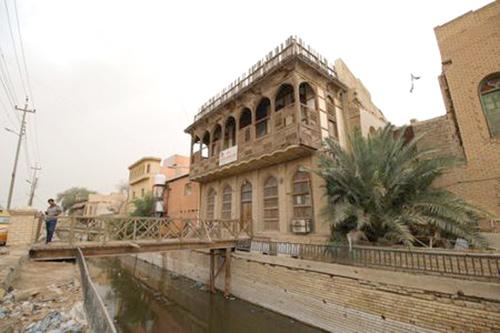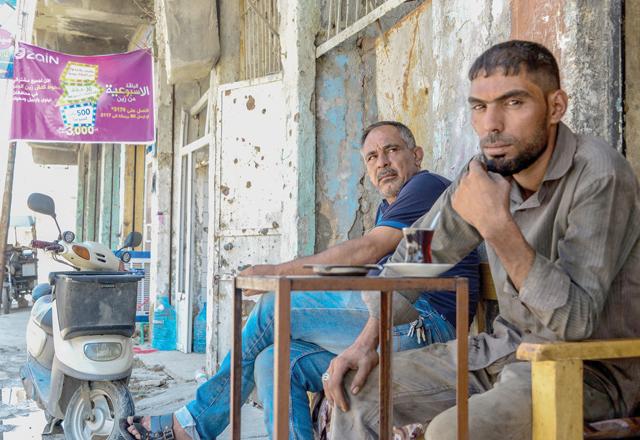You are here
Once Iraq's Venice, Basra's waters have now turned deadly
By Reuters - Sep 26,2018 - Last updated at Sep 26,2018
BASRA, Iraq — Once dubbed the "Venice of the Middle East" for its canals, Iraq's crumbling port city of Basra is slowly dying of thirst.
Crisscrossed waterways that earned it comparisons with the Italian city are now filthy pools of stagnant water.
Its vibrant freshwater Lifeline, the Shatt Al Arab river that runs through it, is now so polluted it threatens the lives of the more than 4 million inhabitants of Iraq's second city.
"It now causes death. It is highly polluted. Different pollutants can be found in the river, including germs, chemicals, toxic algae coupled with unprecedented concentrations of salt almost like that of seawater, rather, it is indeed seawater," said Shukri Al Hassan, Marine Science lecturer at Basra University.
According to Hassan, contamination levels of Shatt Al Arab have increased four-fold over the past 10 years and are increasing, putting more and more people at risk.
Lethal mix
Daily life also features open sewers and streets filled with fetid piles of garbage. In response, furious residents recently staged some of the biggest protests in years.
Many contrast their impoverishment with the oil wealth the province provides to the federal government's coffers.
State officials blame a public funding crisis wrought by years of low oil prices for the hardship in a city that was a magnet for Middle Eastern tourists until the early 1980s.
Local resident Raad Shabout Dhahar said the water crisis is just one of many problems that have left his 17-member family, including two wives, his mother and 14 daughters, in despair.
"It has become even harder because if one used to earn 10,000 Iraqi dinars [$8.43] a day, one can spend five thousand on food and save the other five, while now, we really started to feel the pinch," he said.
"Before a quantity of 500 litres of water was enough for us as we used it for drinking only. We did not use it for washing our faces and clothes and we did not use it for bathing. But now, the 500 litres are used also to wash our faces and bodies, too."
Cesspools
Located where the Euphrates and Tigris rivers merge near the Gulf at Iraq's marshy southern tip, Basra is one of the few cities in the Middle East without an effective water treatment system.
It had advanced sanitary infrastructure in the 1960s but that broke down decades ago, turning waterways into cesspools whose stench is compounded by the hot desert climate.
Residents said the water crisis has added to misery caused by shattered infrastructure because of years of under-investment, first under Sunni leader Saddam Hussein and then successive Shiite-led governments.
Much of Iraq suffered destruction in a string of ruinous wars since the 1980s. But Basra was especially hard hit as a city on the front line of the war with Iran, only a few dozen kilometres across the Shatt Al Arab delta to the east.
The city has yet to recover.
Basra residents say salt seeping into the water supply has made it undrinkable and sent hundreds to hospital.
Some 90,000 people have been admitted to hospital, according to the head of Basra's health department, Riyadh Abdull Amir, with as many as 4,000 a day seeking treating this month.
Resident Aqeel Shakir Abdul Majeed had little hope for the future as he waited to pay for fresh water.
"How can poor people afford it? How can those who do not have money afford it," he said. "Will they steal to get money? I do not know what to do."
To improve water supply, the central government is building a major water treatment plant and a desalination complex thanks to a Japanese loan.
The project was expected to be completed by the end of the year, but the departure of Japanese experts due to threats during protests has delayed the process.
Related Articles
BASRA, Iraq — When Iraqi merchant Jabar Mohamed was growing up in the southern port city of Basra, he liked to watch boats gliding along a c
BASRA, Iraq — Frozen in time for 20 years, two superyachts lie at the confluence of Iraq's Tigris and Euphrates rivers, bearing witness to t
BAGHDAD — Human Rights Watch (HRW) on Monday warned of a repeat of last year's deadly water crisis in Iraq's oil-rich southern province of B

















